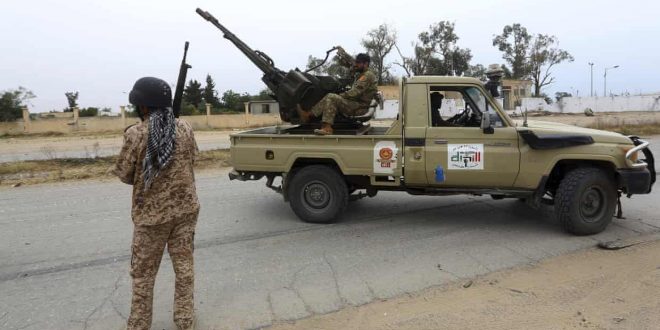Factions step up offensives while international actors distracted by coronavirus pandemic
Libyan armed factions have defied a UN call for a “global ceasefire” by escalating fighting across the country, with forces loyal to eastern warlord Gen Khalifa Haftar claiming to have gained control of a string of towns in the north-west.
A spokesman for Haftar said his forces, the Libyan National Army (LNA), had also repulsed an offensive by the UN-backed government of national accord designed to capture its key airbase – the failure of which will increase the fragility of the Tripoli government and its dependence on its Turkish backers.
The two sides in a conflict that has raged since 2014 briefly agreed last weekend to a humanitarian truce, but within 24 hours fighting resumed at an even more intense pace. Both sides seem to believe that with international actors distracted by the coronavirus pandemic now is the right moment to try to take decisive steps in the civil war.
Tripoli, the capital, has seen some of the worst bombardments since Haftar launched a renewed offensive in April last year, prompting the government there to launch a rare counter-offensive operation to try to seize Haftar’s al-Wutiya airbase. The bombardment of Tripoli continued on Thursday night.
Turkey has started to use drones deeper into LNA-controlled territory in an effort to disrupt the Haftar offensive.
The LNA’s spokesperson, Maj Gen Ahmad Al-Mismari, claimed it had captured several areas in north-western Libya, including the towns of Jumail, Regdalein, and Zultun, so surrounding Zuwara 62 miles (100km) west of Tripoli from three sides. He also claimed more than 100 Syrian fighters brought to Libya by Turkey had been killed in the last 72 hours.
The upsurge in fighting, probably the worst since the current phase of the civil war began, came as the first coronavirus case was revealed in the country and led to yet another UN security council call for both sides to end the fighting. But the UN’s credibility in Libya is at rock bottom with weapons embargoes openly breached and the UN special envoy, Ghassan Salamé, quitting in disgust at competition in the country by the big powers.
In a statement after closed video discussions and a briefing on Thursday by the acting UN special representative, Stephanie Williams, the UN said it was concerned at “the significant escalation of hostilities on the ground in Libya”.
Jonathan Allen, the UK senior diplomat at the UN, warned it was “next to impossible for the brave doctors and medical professionals in Libya to do what they need to do to save people”. He added that the generals and politicians were only deluding themselves by claiming there was a military solution to Libya’s political disputes.
The US ambassador to Libya, Richard Norland, also signalled a tougher US approach to the conflict, saying suspending military operations in Libya, especially in Tripoli, is a key goal of US diplomacy.
He told Arab Weekly: “Those who say that they are concerned about the rise of Muslim extremism or the rise of militias in Tripoli and use this as a justification for the offensive on Tripoli miss the point that the offensive is having precisely the opposite effect. It is empowering militias. It is making the government more dependent on militias. It is giving extremist voices a greater say in what happens.”
He also hinted that Washington was piling pressure on external actors “whose role has sometimes helped to fuel the conflict”. He added: “For them, a tougher approach is on the cards. It is time to name names.”
Meanwhile the EU reached an agreement on Thursday to launch a naval mission in the Mediterranean Sea to enforce a UN-mandated arms embargo on Libya. Opposition to the mission, mainly from Austria, was overcome.
The goal of the mission – named Operation Irini, the Greek word for peace – potentially puts the EU at risk of confrontation with Turkey, which is sending its weaponry by boat, while the United Arab Emirates, backers of the LNA, sends its support by air and so is unlikely to come across any EU interdiction.
The previous naval mission, Operation Sophia, was discontinued as countries such as Austria and Italy argued that it acted as a “pull factor” for refugees, encouraging migrants attempting to reach Europe via Libya to set out to sea in the hope of being rescued.
Greece offered its ports as disembarkation points for migrants saved at sea by the mission’s warships, a Greek government official said. The previous refusal of any country to make this gesture led to the Austrian and Italian objections to the new operation.
Libya’s preparation for a coronavirus outbreak comes as the country’s financially debilitating oil stoppage has also continued from January, costing the nation nearly $4bn (£3.2bn) so far, the Libyan National Oil Corporation has said.
The recent collapse in the worldwide oil price will make it more difficult for the country to stem its deficits once oil production starts.
The Guardian
 Lebanese Ministry of Information
Lebanese Ministry of Information



